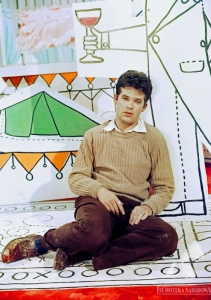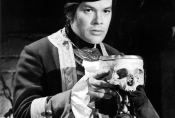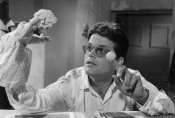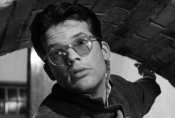Zbigniew Cybulski

One of the most outstanding Polish film actors, perhaps the only one to achieve cult status, Cybulski personified and expressed the internal conflicts and fears of his entire generation, and indirectly – the whole nation. The character of Maciek Chełmicki in Popiół i diament/Ashes and Diamonds by Andrzej Wajda was a bridge between the experience of the lost generation –the Home Army veterans, the adolescents condemned to the rubbish dump of history, as propaganda called them then – and the disappointment of the post-October young intelligentsia. Cybulski wore his own, contemporary clothes, which he refused to change for more appropriate jacket and boots – his acting style was modern and ahead of its time: spontaneous, full of repressed emotions conveyed through gestures, movements, and glances.
That spontaneity and emotional heat became Cybulski’s trademark from the very beginning of his career: they are already noticeable in Wajda’s Pokolenie/Generation, as well as in all his later roles, no matter how small, including that of his last performance before his tragic death under the wheels of a train at Wrocław station – as a coach in Jowita by Janusz Morgenstern.
He was born on November 3, 1927 in Kniaże near Stanisławów, died on January 8, 1967 in Wrocław. A graduate of the Theatre Academy in Kraków (1953), he previously studied at the Consular Faculty of the Kraków School of Economics, and journalism at Jagiellonian University. Shortly after graduating from acting school, he was hired by the Wybrzeże Theatre in Gdańsk (1953–1955, 1958–1960), where he and a group of colleagues from school (including Bogumił Kobiela) founded a literary cabaret called Bim-Bom (1954–1960). Their circle was portrayed in Morgenstern’s film Do widzenia, do jutra/Goodbye, Till Tomorrow, in which Cybulski not only played a lyrical version of himself, but which he also co-wrote.
After arriving in Warsaw, he worked in two theatres, Wagabunda (1960) and Ateneum (1960–1963), although he was regarded mainly as a film actor. Among the more than thirty roles he played, many were similar to his legendary performance in Popiół i diament/Ashes and Diamonds, while others were quite different or even mocking, such as, for example, in Jak być kochaną/How to Be Loved by Wojciech Jerzy Has, or Salto by Tadeusz Konwicki. His performance as Alphonse van Worden in Manuskrypt znaleziony w Saragossie/The Manuscript Found in Saragossa was unlike any of his other roles – under the guise of a fairy-tale costume spectacle, a drama of self-discovery played out. Cybulski’s comic talent is best showcased in Giuseppe w Warszawie/Giusseppe in Warsaw by Stanisław Lenartowicz. After the communist authorities suppressed the Polish Film School, Cybulski was cast in intimate dramas about the “little stabilisation” era and therefore had no chance to create a new character, one that would – like Chelmicki – function within a mythical space, and both critics and audiences blamed the actor for the situation.
There is no doubt, however, that Zbigniew Cybulski made a name for himself in the history of Polish cinema like no other actor, and there are several films devoted to him that can prove this: Andrzej Wajda’s Wszystko na sprzedaż/Everything For Sale and Zbyszek by Jan Laskowski.
Since 1969 (not each year, though) the Zbigniew Cybulski Award is given to the best Polish young actors.
Magda Sendecka
Selected filmography
-
1958
ASHES AND DIAMONDS
reż. Andrzej Wajda
-
1958
CROSS OF VALOR
reż. Kazimierz Kutz
-
1959
THE TRAIN (NIGHT TRAIN, BALTIC EXPRESS)
reż. Jerzy Kawalerowicz
-
1960
GOODBYE, TILL TOMMOROW
reż. Janusz Morgenstern
-
1960
INNOCENT SORCERERS
reż. Andrzej Wajda
-
1962
HOW TO BE LOVED
reż. Wojciech Jerzy Has
-
1964
THE MANUSCRIPT FOUND IN SARAGOSSA
reż. Wojciech Jerzy Has
-
1965
SALTO
reż. Tadeusz Konwicki




















